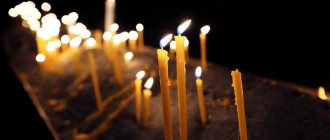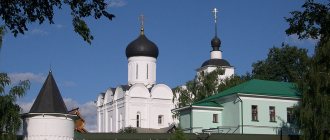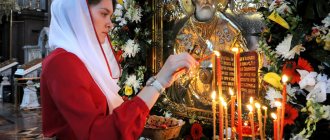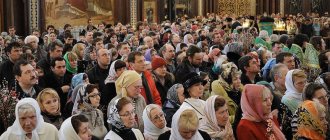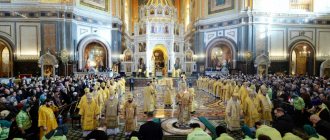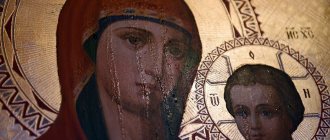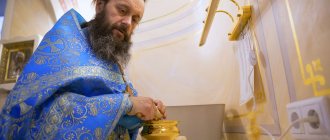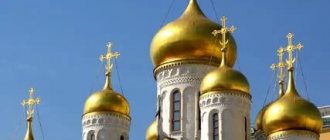In ancient times in Rus', believers sanctified every step of life with prayer. On holidays and Sundays the whole family attended church services. Weddings, births of children, funerals - everything was accompanied by prayer in the temple. Before starting agricultural work, traveling, and even digging a well, prayers were ordered from the church. Any work was accomplished with God's blessing.
Now good traditions are forgotten. Many people do not know why a prayer service is needed, what it is and how to pray correctly before important life events. You should not wait for insurmountable difficulties or serious illness to turn to God. It is better to find out in advance how to order a prayer service and in what cases it should be performed.
The difference between a prayer service and home prayer
A prayer service is a short service that includes prayers and requests from a specific person or group of people for a specific undertaking. In the church, the prayer service is otherwise called “treba”, from the word “need”, “necessity”. Prayers can only be performed for living people baptized in the Orthodox faith. The prayer for the departed is called Panikhida.
Prayer service in the church.
Important! You can order a prayer service only on those days when the Church allows them to be performed. Petitionary requests are not served during the days of Great Lent, with the exception of Saturday and Sunday.
Why perform services in church when God hears sincere prayer anywhere?
By gathering for prayer in church, praying for each other, believers show Christian love and overcome mutual grievances, if any. The invoked saints invisibly stand next to those praying. God's grace present in the temple strengthens the unanimous petition and makes it pleasing to God. This is the meaning of conciliar (church) prayer.
To perform church prayer, a person has to put in effort and make sacrifices, albeit small ones. And any work for your neighbor and your own soul is pleasing to the Lord. Home prayer only prepares a person for church prayer. It is also necessary and audible to God, but has less power.
About the temple:
- How to behave correctly in church for children
- How to properly place candles in a temple
- About the altar of an Orthodox church
“Let no one fear death!”
It is not always possible for a person to participate in a prayer service. Many people come to church, order a prayer service, write a note with the names of those for whom they ask to pray, leave a donation and leave. Does such a prayer make sense? Of course, if we ourselves cannot, let others pray for us. And that's a lot. After all, even the desire to be prayed for is already a kind of beginning of prayer. But, if possible, it is much better to come to the prayer service yourself.
“I will not die, but I will live...” But I will die! Even if I am completely healthy, I still cannot avoid death. Even if you are healthy... And the prayer service most often gathers those who are very unwell. Or their loved ones. Does it often happen that after a prayer service the illness goes away and health returns? It happens, but, to be honest, not often. This is still a miracle, and miracles, we believe, are possible, but not frequent.
We are all destined to die someday, except for those who live to see the second coming of the Lord. But to us, believers, the words of St. John Chrysostom are addressed, which we hear annually at the end of Easter Matins: “...Let no one fear death, for the death of the Savior has freed us!...Death! where is your sting?! Hell! where is your victory?! ...Christ has risen and life triumphs! Christ is risen and no one is dead in the tomb! ..." The saint to whom these words belong, dying, said: "Glory to God for everything."
Sorrows and illnesses are temporary. They will end. Eternal life, eternal joy will never end if in this temporary life we do not despair and do not lose faith, if we do not extinguish love. So that we are not overcome by despondency, so that faith and love increase, we gather together for common prayer, asking for God’s help. And we have no doubt that we will definitely get it.
"Boring Garden"
What is a custom prayer service?
Prayer services can be church-wide or custom-made. Following the former, the entire Church prays on major holidays or state events. The latter are carried out at the request of individual parishioners for the success of their private affairs.
Water-blessing prayer service.
Attention! Custom prayer services can be held in a church or at home. You can also ask the priest to serve the service where the business is supposed to begin: at the site of laying the foundation of a house, in a field before sowing, in the room where a store or office is opening.
How to pray correctly during church services
When holding a prayer service in church, observe the following rules:
- before entering the temple, do not forget to cross yourself and bow;
- a woman must have a scarf on her head, and men, on the contrary, are prohibited from entering the temple with their heads covered;
- clothing should be strict, covering all parts of the body;
- You should not shout or talk loudly in the temple, especially while reading a prayer;
- do not interfere with others' prayers;
- turn off your mobile phone so that it does not distract others;
- Make sure that your children do not run around the temple and do not go into places they are not supposed to.
What types of prayer services are there?
Prayer services can be simple, thanksgiving, water blessing and akathist. Any of them can be ordered individually, but more often they are performed conciliarly, i.e. with a large crowd of people.
- Water-blessing prayers are served in churches daily or on Sundays. It is obligatory for the customer to pray during the service, then take the blessed water and take it home with reverence. All family members drink it on an empty stomach in the morning and sprinkle it around the home. At the water blessing prayer you can submit icons and crosses for consecration.
- Simple prayer services are performed on the occasion of saints' feast days. On it, short hymns are sung in honor of the Mother of God and the saint and a litany is pronounced - a series of petitions with the refrain “Lord, have mercy.” The litany remembers the names of those who ordered the prayer service and their relatives. Then a prayer is read to the saint. A simple prayer service is good to order on a name day or for a sick person.
- A prayer service with an akathist is often served in front of miraculous or revered icons, on days of celebration of great saints. Usually the service is held weekly, at a certain time, which can be found out in the temple or monastery. When going to prayer, it is better to take the text of the akathist to follow the reading.
- A prayer service of thanksgiving is served collectively on New Year's Day, Victory Day, the Nativity of Christ and other significant days. Having received what you asked from the Lord, you need to order a prayer of thanksgiving in the temple. On the note with the names “about health” the name of the prayer service is added. There is no need to write the reason why it is ordered. If it is not possible to serve the prayer individually, then petitions of thanks are included in the general prayer service performed according to the church schedule.
Other church commemorations - masses, magpies, proskomedia - do not belong to prayer services, but are performed during the Liturgy.
How to write notes
To remember at a prayer service, you must submit a note with names about health to the candle box (kiosk) . On a special form or neat sheet of paper, write the heading “Prayer of supplication (or thanksgiving) for health,” then indicate to whom the service is being ordered: the Lord, the Most Holy Theotokos, the saint (name). Below in a column, in legible handwriting, the names of living, baptized Christians are listed. A note with a donation is passed to the kiosk or directly to the table where the demand is sent.
Notes for prayer
Additional petitions at prayer services
Traditionally, churches serve one prayer service for everyone, including individual petitions indicated in notes. For different cases, you can order the following petitions:
- about the health of the sick
- about those going on a trip (trip, business trip)
- thanksgiving to God
- about the beginning of every good deed
Who do we pray to?
“Blessed be our God always, now and ever, and unto ages of ages!” - this is how it is customary to begin a prayer service in the Orthodox Church. With this exclamation, uttered on our behalf by the priest, we immediately testify that for us there is no one higher than God, and nothing is more valuable than communication with Him. And that we completely trust Him, even if what is happening to us now is sad and painful. He knows what paths to lead us to Eternal Joy. He revealed to us that “through much tribulation we must enter into the kingdom of God (Acts 14:22).” And he not only said this, but also became a Man Himself in order to share the pain with us. There is something immoral when you call on others to suffer and endure, while you yourself are not involved in the suffering. One who has not experienced anything similar himself will never be able to fully understand the suffering of another. The God in whom we believe will understand anyone, because he does not know about suffering from the outside. Every time, making the sign of the cross or looking at the Holy Crucifixion, we remember what He experienced in order to share with us the bitter path of our life. And if a common grief has brought us together for a prayer service, then it is common not only for us who pray, but also for Him to whom we turn with prayer.
Usually, after an exclamation by all participants in the prayer service, the prayer “To the Heavenly King...” is sung. It is addressed to the Holy Spirit. When, on the fiftieth day after the Resurrection of Christ, the Holy Spirit descended on the disciples of the Lord, the Church was born - the unity of believers in Christ. Before the prayer service began, we were united by a common goal, a common pain or a common joy. Now the Holy Spirit, the Spirit of Truth, the true Comforter of all those seeking consolation and help, unites.
Then troparia are usually sung, that is, short hymns and prayers to those for whom a prayer service has been ordered: to the Lord, to the Mother of God, to the Saints... There are different troparia, but they are usually preceded by the hymn “God is the Lord and appear to us. Blessed is he who comes in the name of the Lord.” This verse from Psalm 117 is repeated four times, alternating with four other verses. I will not cite and explain them all, but one of them is especially consonant with the aspirations of many who pray: “I will not die, but I will live, and I will tell the works of the Lord” (Ps. 118:17) After all, those who are between lives often come to the prayer service and death. How important it is for them to hear such assurance from the lips of a clergyman! “I won’t die, but I will live...!”
After the troparions, chants, or short prayer addresses, are sung to those for whom the prayer service will be held. “Glory to Thee, our God, glory to thee”, “Sweetest Jesus, save us”, “Most Holy Theotokos, save us”, “St. Father Nicholas, pray to God for us”, etc.
We are often asked who to pray to in this or that case. “I have such a problem, but I don’t know who to pray to! Please tell me". By and large, all our prayers, all our prayer services are addressed only to God. Only He can save us, only from Him comes the power that strengthens, heals, cleanses and renews us. What about the saints? They are our prayer companions. When ordering a prayer service to this or that saint, we ask him to pray with us, to pray for us. We never ask any saint to “save” or “have mercy.” It's not in their power. “St. Father Nicholas, pray to God for us,” “Holy Great Martyr and Healer Panteleimon, pray to God for us,” etc. This is the only way we turn to the saints, asking for their help. Because their prayer has incomparably greater power than ours, because saints are those who managed to become true friends of God, who confirmed their faith and love with their lives. They pray effectively for us.
Only for the Most Holy Theotokos is an exception made. Turning to Her, we say: “Most Holy Theotokos, save us.” Such an exception is understandable to everyone who understands the special significance of the feat of the Virgin Mary in the matter of our salvation. The degree of Her closeness to God is so great! Remember, in Cana of Galilee, She managed to beg Jesus Christ to perform a miracle, which was not at all part of His intentions. Who among the saints ever had such boldness!
Prayers performed outside the temple
A priest can be invited home to perform the following requirements:
- consecration of a house (served in a newly built house or apartment if necessary), office space, or enterprise.
- consecration of a field or garden
- consecration of vehicles
- laying the foundation, well (water-bearing well).
Special prayer services exist for the beginning of the construction of the church, the installation of the cross, and the raising of the bells.
Custom prayer service
Annual prayer services
- The New Year is a special celebration celebrated in the church on the civil New Year, on the New Year according to the old style.
- Thanksgiving prayer for the Nativity of Christ - served in memory of the victory in the Patriotic War of 1812
- The Great Blessing of Water is the feast of the Epiphany. The main one of the water-blessing prayers.
- Thanksgiving on the first Sunday of Great Lent (Triumph of Orthodoxy) - in honor of the restoration of the veneration of icons in the 9th century. Christians owe this event many miraculous icons and the opportunity to pray in front of the images of the house.
- Consecration of honey (Honey Savior) is a prayer service held on August 14, in memory of the “removal of the Trees of the Cross of the Lord.” During epidemics raging in the summer in the 7th and 8th centuries in Byzantium, it was customary to go around cities with a shrine - particles of the Cross of the Lord, asking the Lord for deliverance from the disease. This event has nothing to do with honey, but since honey harvesting began in Rus' by mid-August, the first fruits of the harvest were brought for blessing and donation to the church. At the water blessing service held on this day, a prayer is read for the blessing of honey.
- Consecration of fruits (Apple Savior), August 19 - refers to the feast of the Transfiguration of the Lord. On this day, a water-blessing prayer service is served with the reading of prayers for the consecration of fruits. A separate prayer is read for the consecration of grapes; this fruit is especially revered in the Church; wine for Communion is made from it.
- Nut Savior is a holiday in memory of a miracle performed by the Lord at the request of King Abgar. Wanting to have a portrait of Christ, the king sent a painter to paint Him. Taking the canvas from the artist, the Lord applied it to his face and the Most Pure Face was displayed on it. On this day, on the occasion of the ripening of nuts, the consecration of the first harvest takes place.
- The beginning of the youths' teaching is a special prayer service held on the occasion of the beginning of the school year. Notes with the names of schoolchildren and students are submitted. Such prayer services are also performed in educational institutions.
You can submit health notes at any of the listed prayer services.
Methods of carrying out
A thanksgiving prayer service to the Lord is carried out in different forms, among which the key ones are:
- a general ritual that occurs during the performance of most prayers;
- solitary prayers aimed at resolving personal, secret problems.
General
The general ritual is used in churches during large celebrations, when a large number of believers come to the church to offer prayers of praise to the Lord God. On such days, the priest turns to the Almighty on behalf of all the parishioners gathered in the temple, which strengthens faith and calms the spirit.
As a rule, such prayer services drag on for a long period of time, since the petitions of many people are voiced. A ritual of following a prayer service is also organized, which can be held both in the temple itself and in the fresh air.
Secluded
Solitary prayers are used when a believer needs to turn to the Lord God personally, and his experiences are not intended for a large number of ears. In such appeals to the Almighty, a person humbly asks for help in matters for which he does not have the spiritual and physical strength to implement. Such prayers are allowed to be held at home.


